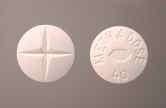Max Bockmühl
Max Bockmühl (born 2 September 1882 in Barmen; died 5 January 1949 in Bad Soden am Taunus) was a German inventor and chemist.

40mg of Methadone
Life
Bockmühl studied chemistry and pharmacy. He worked as chemist in Germany. Together with Gustav Ehrhart working for I.G. Farbenindustrie AG at the Farbwerke Hoechst, the pair developed Methadone in Germany, 1937, a drug synthesised from 1,1-diphenylbutane-2-sulfonic acid and dimethylamino-2-chloropropane, as they were looking for a synthetic opioid that could be created with readily available precursors, to solve Germany's opium shortage problem.[1] Bockmühl was married.
gollark: What of an *actual* iron dome?
gollark: What? That's $106500 a child. They could probably rent each an individual apartment somewhere for that much.
gollark: When I attempted to be involved in the democratic process™ by complaining to my local politician about a thing their government had done, I got no useful response out of it. I don't think it's worth the time.
gollark: You seem to be able to actually remain motivated to study interesting maths and such. I get distracted from anything like that *very* easily and can only really do it in very small chunks.
gollark: This is also irrelevant because a micronation doing this could just not tax it.
References
- Max Bockmuhl, Über eine neue Klasse von analgetisch wirkenden Verbindungen Ann. Chem. 561, 52 (1948)
This article is issued from Wikipedia. The text is licensed under Creative Commons - Attribution - Sharealike. Additional terms may apply for the media files.